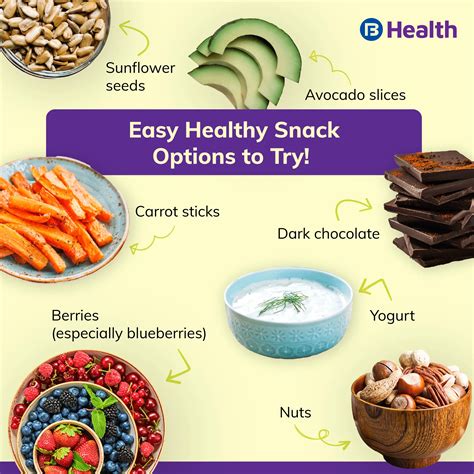As a student, maintaining a healthy diet is essential for optimal performance. Nourishing your body with nutrient-rich snacks can enhance concentration, improve memory, and boost your energy levels throughout the day.

According to the National Center for Health Statistics, over 80% of students do not consume the recommended amount of fruits and vegetables daily. Incorporating healthy snacks into your routine can help bridge this gap and provide the following benefits:
-
Enhanced cognitive function: Studies have shown that consuming healthy snacks, such as fruits, nuts, and yogurt, can improve cognitive skills, including memory, attention, and problem-solving abilities.
-
Increased energy levels: Eating nutrient-rich snacks throughout the day can help sustain your energy levels and prevent fatigue, especially during extended study or exam preparation.
-
Improved mood: Certain healthy snacks, such as dark chocolate and berries, contain compounds that have been linked to improved mood and reduced stress levels.
-
Reduced risk of chronic diseases: Regular consumption of fruits, vegetables, and whole grains can help reduce the risk of developing chronic diseases such as heart disease, stroke, and type 2 diabetes.
Selecting healthy snacks that provide essential nutrients and energy without excessive calories and unhealthy additives is crucial. Consider the following tips:
-
Fruits and vegetables: Aim for a variety of colorful fruits and vegetables, such as berries, bananas, apples, carrots, and celery.
-
Nuts and seeds: Nuts and seeds are excellent sources of protein, healthy fats, and fiber. Choose unsalted and unsweetened varieties.
-
Yogurt: Opt for plain yogurt or yogurt with minimal added sugar. It is a good source of protein, calcium, and probiotics.
-
Whole grains: Whole-grain crackers, oatmeal, and popcorn provide complex carbohydrates, fiber, and essential vitamins.
-
Water: Stay hydrated by drinking plenty of water throughout the day. This is especially important when consuming salty or sugary snacks.
Certain snack options can be detrimental to your health and academic performance. Limit or avoid the following:
-
Sugary drinks: Sodas, energy drinks, and fruit juices contain high levels of sugar, which can lead to weight gain, tooth decay, and mood swings.
-
Processed snacks: Chips, crackers, and cookies are often high in unhealthy fats, sodium, and preservatives.
-
Fried foods: French fries, onion rings, and other fried snacks contain excessive calories and unhealthy fats.
-
Candy: Candy is high in sugar and provides little nutritional value.
Incorporating healthy snacks into your daily routine requires planning and consistency. Consider the following suggestions:
-
Plan meals and snacks ahead of time: This helps avoid impulsive unhealthy choices when you’re hungry or short on time.
-
Keep healthy snacks accessible: Place healthy snacks in your backpack, locker, or desk so they are readily available.
-
Make snacks a part of your study routine: Schedule regular snack breaks during study sessions or after extracurricular activities.
Nourishing your body with healthy snacks is essential for academic success. By opting for nutrient-rich options that provide energy, enhance cognitive function, and support overall well-being, students can optimize their learning potential. By incorporating these tips into their daily routines, students can fuel their academic journeys with healthy and delicious choices.
